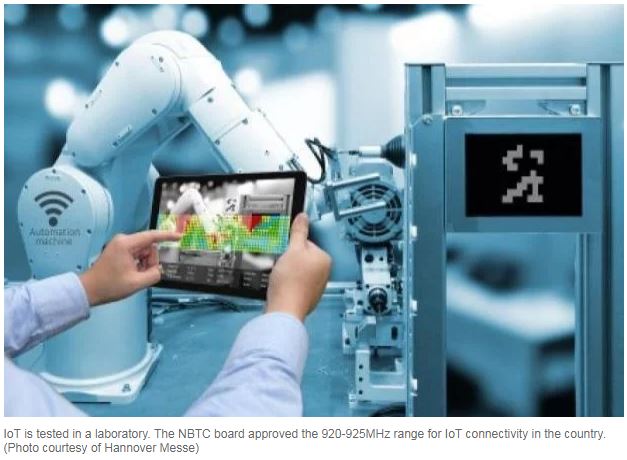Thailand: IoT regulations due next year
A series of regulatory conditions for the Internet of Things (IoT) and related device connectivity are scheduled to be implemented by 2019 to handle machine-to-machine connectivity in the industrial sector, with 5G wireless broadband set for worldwide commercial launch by 2020.
The general data of IoT users could be used to optimise public benefits through big data analytics management to facilitate public services.
The telecom regulator set up a committee to draft a regulatory framework for IoT and connected devices on April 4. The committee has been discussing five categories for initial regulatory conditions: numbering and identification; spectrum and technical standards; permission related to radio communications and competition; security and privacy; and data arrangement structure and data interoperability.
The NBTC board recently approved the 400MHz range as additional spectrum for IoT usage in the utilities sector, assigned for smart meter connectivity.
Korkij Danchaivichit, deputy secretary-general of the National Broadcasting and Telecommunications Commission (NBTC), said smart meters are critical for IoT adoption. The NBTC is working with the Interior Ministry to coordinate with electricity and waterworks authorities.
Smart meter connectivity for utilities must be separated from other spectrum ranges to secure billing systems.
Globally, huge numbers of organisations and startups are improving IoT applications.
IoT in Thailand is nascent, Mr Korkij said, as there are only 15,000-20,000 connected devices in the market.
The NBTC must initiate all related regulatory conditions to prepare for systematic governing and promoting usage.
The NBTC board approved 920-925MHz as the unlicensed spectrum range for IoT connectivity in December 2017. The range is a spectrum standard set for machine-to- machine connectivity. Interested companies have applied for operating permission under Type 3 telecom licences to provide IoT devices and services in the market.
The Type 3 licence gives telecom operators that rent telecom networks a legal avenue to provide services.
Personal Data Protection
Mr Korkij said the IoT regulatory draft is pending clarity from the upcoming Personal Data Protection Law, which will determine what kind of customer data the regulator or the third party can use for the public interest and what should be strictly protected as personal data.
The existing data protection draft bill has not been submitted to the National Legislative Assembly for consideration.
Mr Korkij said the NBTC’s Telecom Business Act lets operators use customers’ general data only for telecom service purposes.
“General data such as the duration of customers’ daily mobile usage could be utilised for better efficiency of public services such as transport design and management,” he said.
The NBTC has to update and visit IoT use cases and regulatory conditions abroad for additional information to develop the regulatory draft. The NBTC plans to send a team to visit China and Europe in early 2019.
The NBTC also set up a subcommittee to handle the five critical categories. The subcommittee agrees in principle that the numbering usage for IoT connectivity will be run through a 15-digit system in compliance with the current practical standards of the International Telecommunication Union.
IoT numbering and identification will cover numbering fees, registration for usage, number portability and other identification methods such as IP addresses.
Security and privacy, as well as data arrangement structure and data interoperability, are other critical issues for IoT regulation.
According to a China Mobile report, there were 200 million IoT connections at the end of 2017 in China.
Source: https://www.bangkokpost.com/business/telecom/1582330/iot-regulations-due-next-year


 English
English




